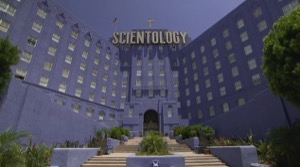
I now live five blocks from the giant blue Scientology building in Hollywood, and I often catch a bus at the corner of Sunset Boulevard and Vermont Avenue, where young Scientologists, wearing blue blazers and solicitous smiles pass out proselytizing leaflets proclaiming, as all religions do, that they have the true answers to enlightenment. I avoid them. This is unfair and, honestly, bigoted, because the vast majority of Scientologists are good people looking for answers to life’s problems; they are not among the members of the Church hierarchy who, according to critics, operate like an organized criminal syndicate that happens to also be a cult. But you never know who among the foot soldiers is actually, well, a soldier who might eventually con me, stalk me, or keep me prisoner in a desert compound. As someone who has spent his life looking for answers to deep emotional questions, I have great empathy for people doing the same thing. But after watching Going Clear, Alex Gibney’s extraordinary and damning documentary based on Lawrence Wright’s book of the same name, I worry for these young Scientologists and what might happen to them.
Using archival footage, interviews with former church members, and Wright’s great muckraking, Gibney tells the story of Scientology’s origins as the invention of science fiction pulp writer and eccentric L. Ron Hubbard to its current form as a multi-billion dollar non-profit corporation run by David Miscavige who is, according to the film, a paranoid megalomaniac. Even if you thought you knew a good deal about Scientology, as I had, you might be flummoxed by the story Gibney tells. Old interviews with jocular Hubbard discussing Scientology’s teachings and his best-selling book Dianetics – described as “folk psychology” by one critic in the film – are interspersed with damning recollections of Hubbard’s first wife and early adherents, who tell of confessional “auditing,” forced labor, kidnapping, tax evasion, child neglect, and what most would deem to be brainwashing.
When Hubbard died in 1986, his young, pathologically ambitious deputy David Miscavige assumed control of the church and led it to become the tax-free conglomerate of religious real estate holdings and celebrity worship. This part of the movie is perhaps even more surprising because it involves characters we know, and the story of how the church almost lost Tom Cruise to Nicole Kidman and then destroyed their marriage in order to keep him and turn him into the wacky envoy of the Church to the world is both horrifying and darkly hilarious. While it is implied that the church controls Travolta and Cruise partly by blackmailing them with knowledge of their same-sex relations, for what I assume are legal reasons, Gibney doesn’t say it out right. But Oscar-winning writer and director of Crash Paul Haggis describes leaving the church when he found out how horribly it was treating his two lesbian daughters.
Scientology is much more famous than it is popular. There are probably only around 100,000 actual active Scientologists in the world (even if the Church claims, speciously, many more) but because of the religion’s foothold in Los Angeles and its large number of adherents among the Hollywood elite, we hear a lot about it. John Travolta has been a vocal scientologist since the late 1970s and Cruise is its current ambassador. Other famed Hollywood Scientologists: Elisabeth Moss, Giovanni Ribisi, Kirstie Alley, Jenna Elfman and recent Grammy winner Beck. (Oh, and Charles Manson.)
Going Clear is greatly based on its most famous defectors, including Haggis, as well as former Church leaders Mike Rinder, Marty Rathbum and Tom De Vocht. The focus of the film on the Church’s most vocal detractors clearly tilts its point of view, but Travolta, Cruise, Miscavige all refused to be interviewed. But even if they had been, the rest of the evidence Gibney presented wouldn’t have changed.
MOVIES
Going Clear: Scientology and the Prison of Belief
Written and directed by Alex Gibney
Basic on the book by Lawrence Wright
With Paul Haggis, John Travolta and Tom Cruise
Not rated
On HBO












The documentary actually doesn’t give the impression that it blackmails Tom Cruise with info of same sex relations. Just Travolta. With all of the crazy stuff I’m this film it’s important to get facts correct when writing a review.
Steve – they actually do imply the gay blackmail angle in the documentary but it’s somewhat subtle – clearly to avoid litigation. I’ve watched it twice now and it’s pretty obvious to me that’s what they were trying to say without actually saying it. The word “gay” isn’t spoken in reference to Travolta, but rather the particulars of his situation are used to describe how auditing was used to amass secrets that could later be used against him. At one point when one of them was talking about “rumours” surrounding JT, they display a 2012 National Enquirer cover with the headline “Travolta’s Gay Boyfriend Revealed! 6 Year Affair He Hid From Kelly”. That’s pretty clear to me.